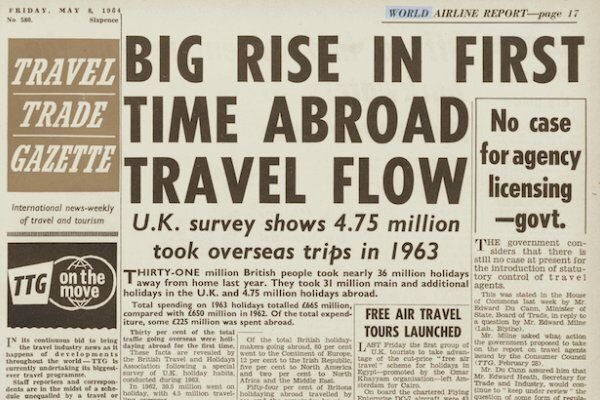TTG at 70: All hail the package in the Swinging Sixties
 Gary Noakes
Gary NoakesIn our 70th anniversary year, TTG is looking back at some of the biggest stories in the history of the modern travel industry, and the effect these key moments have had on the sector as we know it today. This month, we go back to the Swinging Sixties and the rise of the package holiday.
The 1960s saw the travel industry expand in leaps and bounds, causing concern at government level about the lack of consumer protection from unscrupulous or financially unstable companies.
It led to questions in parliament, with one MP, Edward Milne, telling his peers the industry “needs examination by this house – examination of the methods to be followed in its future operations”.
Abta stepped in and came up with Stabiliser, effectively a “closed shop” policy whereby only financially vetted brands could be sold by Abta agencies.
After a vote at an Abta conference in Jersey, the policy was introduced on 1 January 1966 and a common fund set up by Abta to help clients stranded abroad in the event of a collapse.
Abta’s then chairman CD Hopkinson told TTG: “I do not see how anyone can really object to the plan. It isn’t really a closed shop, more a system of stabilising operations.”
However, a report into Stabiliser later blasted it as a “miscalculation” and called for a “partial destabilisation”, arguing “the element of compulsion in membership of Abta is both undesirable and harmful”.
Despite this, the decade ended with fresh demand for the bonding of UK tour operators following the collapse of Wright’s Holidays, which saw a draw on Abta’s common fund of £400,000 in today’s money – nearly half its war chest.
The move resulted in Abta’s man in parliament, MP Kenneth Lewis, seeking compulsory powers from the Air Transport Licensing Board to oversee operators’ financial standing.
Meanwhile, the abolition of retail price maintenance rules on some foreign holidays meant, for example, winter packages to Majorca could be marketed at £32 and eight shillings – £17 below the lowest available scheduled air fare – while Kuoni was now allowed to market 14-day Kenya beach and safari tours for £150 (£2,192 today).
What did it all mean?
As TTG reported extensively, the travel industry in the 1960s was characterised by rapid growth and technological advances including jet aircraft that began to make mass travel affordable.
Like any immature industry, there were casualties among its players that saw travel leaders and politicians begin to voice concerns about consumers being at risk of losing their money.
Firstly, there was the question of the long gap between paying for a holiday and taking it – back then, there was no guarantee customers would be refunded if the operator went bust.
Then there was the issue of who paid for repatriation of clients abroad. It was initially Abta that stepped in with its own solution, one that was not popular because it meant that without an Abta membership, trading was very difficult.
As the 1960s ended, the government showed a growing realisation of the threat of operators taking large amounts of money months before they delivered travel arrangements to the consumer and began to explore the idea of the Atol system we recognise today via the creation of the CAA. This issue of consumer protection was only going to get bigger, parliament realised, although the outbound travel market was still a fraction of what it is today.
A total of 31 million people took UK holidays in 1963, but only 4.75 million went abroad – 30% of whom were travelling overseas for the first time. The average foreign holiday was 15 nights and cost £48 (£804 today). In this regard, the story of the 60s was again one of falling real-term prices enabled by a burgeoning travel industry.
A significant milestone came in 1967 with the launch of an in-house airline by Cosmos Tours. Monarch Airlines was to become a household name and take millions of people abroad on their first foreign trip.
The industry – and consumer protection – was starting to take on a shape that is still familiar to us today.
TTG at 70: Opening up the archives
During our 70th anniversary year (2023), TTG charted the history of the travel industry through a series of special features delving into the magazine's 70-year back catalogue, all of which is archived on the TTG Media website. Here is the story so far:
- How travel took on the Covid crisis – and won
- The long journey to package holiday perfection
- How travel agents have stood the test of time
- The extraordinary rise of the cruise industry
- Aviation's highs and lows through the ages
- The ash cloud, the rise of cruise – and the death of an institution
- How – and why – terror changed travel forever
- The 90s – the decade that just about saw it all
- How travel's boom-bust nature came to be
- The 'big bang' that made travel affordable for all
- All hail the package in the Swinging Sixties
- The rise of mass travel, and where it all began
Sign up for weekday travel news and analysis straight to your inbox

Gary Noakes
Supplier Directory
Find contacts for 260+ travel suppliers. Type name, company or destination.








